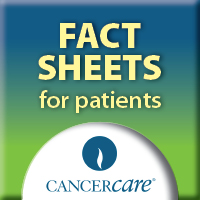The challenges of cancer are different for people between the ages of 18 and 40. At this age, it is typical to feel invincible and believe that serious illnesses happen only to older people. The reality is that most people your age are likely to be healthy. Their concerns and problems may seem far less serious and important than your own. It is important to be able to turn to people who understand your unique challenges and concerns.
Here are some things you can do to help yourself while you are being treated for cancer and once treatment has ended:
Become informed. Obtain reliable information about your diagnosis and treatment. Knowledge is a source of power and can help you feel more in control. Some helpful resources to have on your team may include doctors or nurses, oncology social workers, patient navigators, and insurance case managers.
Make the most out of medical appointments. Writing down questions prior to appointments and bringing someone with you to take notes can help ensure that you are well-prepared and informed.
Accommodate life-cycle interruptions. Sometimes cancer treatments change your typical work or school schedules. Some people are able to modify their daily routines by working or going to school part time. Others may consider short-term disability or taking a leave from school. Talking with health care professionals can also help you find a treatment schedule that meets your individual needs and accommodates prior commitments.
Know your rights. Having a cancer diagnosis does not automatically disqualify you from employment, insurance, or health care. It is important to know what your rights are and what you can do to protect them. Many legal resources are available to answer questions and help advocate on your behalf for access to benefits and services. Whether you have questions about cancer and the workplace, access to health care, or insurance, protect yourself by seeking advice and information from experts at your local legal aid or cancer legal resource center.
Seek professional support. Attending a support group allows you to compare your experiences and solutions with other young adults. Individual counseling gives you the opportunity to address how cancer may affect dating, career goals, and life priorities. Some organizations offer networking events and workshops that can connect you with peers in a similar situation. Many of these services are now easily accessible over the phone and online. CancerCare provides free counseling with licensed oncology social workers who can help connect you to other resources in your community.
Reach out to family and friends. Your family and friends are part of your support team, but they may need more information about cancer to help them understand your situation. The educational materials and websites you turn to for information can also help those closest to you. Keep in mind that others may have different reactions and views about cancer than you do, but education, communication, and understanding are important starting places to get the support you may need.
Manage physical changes. Prepare yourself for any physical changes due to treatment by having your doctor explain and illustrate what these changes may look like. Wear clothes that fit your current size. Consider using a wig or comfortable hats. Your feelings about body image and physical changes are valid, and creating a safe space to explore how you are adjusting can provide relief.
Get information on physical intimacy. Dating and romantic relationships are important, and a cancer diagnosis can often impact how you view these areas of your life. Read educational materials about sexuality and cancer, and continue to pay attention to your needs. Ask your doctor or nurse to refer you to professionals trained in sexual rehabilitation.
Learn about preserving your fertility. Cancer treatments can alter your ability to conceive a baby. You may need to make decisions about preserving your fertility by sperm banking or harvesting your eggs (storing for later use). It is important to speak with your oncologist about fertility concerns before you begin treatment. This is a conversation that should continue throughout your care. For comprehensive information about fertility preservation, contact Fertile Hope (www.fertilehope.org) or The OncoFertility Consortium (www.myoncofertility.org). CancerCare‘s professional oncology social workers can help you explore fertility options as well.
Care for yourself. Whether you listen to calming music, practice yoga, or simply spend time with friends, caring for yourself is important in maintaining good health. Cancer is a part of your life, but having a sense of normalcy is helpful, too. Consider what gave you joy prior to your diagnosis, and find ways of incorporating those things into your new routine.

